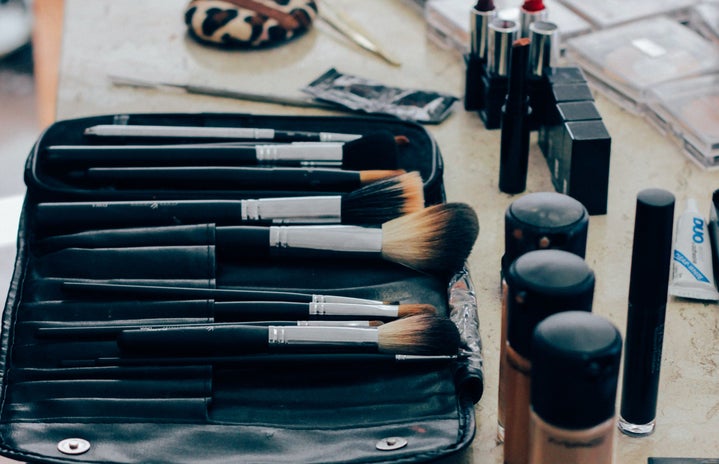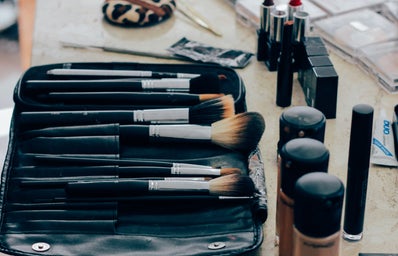Acne is a real drag. And having to look at your skin in the mirror if you have it can seriously take a toll on your mental health. According to acne.org, “the psychological impairments in acne include higher rates of depression, anxiety, anger and suicidal thoughts.” While it’s not proven that acne causes depression, it can happen to anyone who struggles with the condition.
So, when you feel like your acne is affecting your mental health, what should you do? We found a few different ways to help.
Visit a dermatologist to figure out what the situation is
If you find that acne has recently become a significant problem for you, schedule an appointment with a dermatologist. Shannon, a junior at Boston College, says that she didn’t think about how serious it was until her doctor mentioned it.
“I eventually went to a dermatologist, who gave me a strong, medicated cream that I have used ever since,” she says. “My skin is so much clearer now.” Autumn, a recent graduate of Emmanuel College, tried many products before finally getting a prescription medication.
“During my sophomore year of college, I went on Accutane and although that was a brutal and tiring process, the results stuck,” Autumn says. A good derm can help you find a product that will work to clear your acne, and can also help you determine why you’re breaking out.
Related: Apparently A Study Linked Acne to Depression & It Might Have You Reconsidering Your Skincare, Self-Care Routines
Find refuge in retail therapy
If you find that your acne just won’t go away, go shopping for makeup and other skincare products. Some people feel that trying out these products is a great self-care method.
“While I’ll always recommend seeing a dermatologist, I find refuge in trying [skincare] products,” says Makenzie, a junior at Emmanuel College. Consider trying different products, such as face masks or washes to take care of your acne. Makenzie says that buying skincare products recommended by her favorite influencers and reviewing them on Sephora has helped her feel happier.
“It’s a mix of taking the reins on my own skincare AND retail therapy that helps me fight my insecurities,” she says.
Some products you can try are Clinique Acne Solutions Clearing Concealer (Sephora, $18), Neutrogena Oil-Free Acne Stress Control Power-Cream Wash (Target, $7.49), or Sephora Collection Mud Mask Purifying & Mattifying (Sephora, $20).
Learn to look at yourself the way your best friend (or family member) does
Autumn suggests that when you’re struggling with your mental health from acne, think of how your friends look at you.
“My friends never saw my acne or blemishes, they saw me for who I was inside,” she says. “Viewing myself in this way helped me to feel better about my skin and continue to appreciate other aspects of myself more.” Your best friends aren’t going to judge you based on your skin, so think about that when you’re looking at yourself in a mirror.
“Stay positive and know your worth outside of your appearance,” Autumn says. “You are not your acne.”
Dr. Roy Stefanik is a mental health counselor, as well as a clinical assistant professor in the Department of Psychiatry at Georgetown University School of Medicine and part of the clinical faculty at George Washington University. Stefanik suggests taking an “inventory” of yourself.
“What features about yourself, both physically and emotionally, do you like about yourself? Do you find yourself relying on external validation more than perhaps you should?” he asks. Try to think about how you feel about yourself, and relate it back to what your friends and family think as well. Ultimately, you should remember that your appearance is not the only factor.
Try going makeup-free a few days a week
Makeup is an obvious way to cover up your acne, but there are many other ways to deal with acne instead. You can use medication, skincare products and face washes. When Shannon developed acne from stress, she felt she had to start wearing makeup.
“I never wore makeup daily until going to college,” she says. “I love going makeup-free or minimal with my makeup a few days a week, but I felt like I couldn’t do this anymore.” Once her acne started to go away, her self-esteem improved and she had the confidence to not wear makeup every day.
“Try and figure out a way to get rid of the acne instead of covering your skin with makeup that’s just going to clog your pores,” Shannon says. She also advises going makeup-free once a week. Whether you feel more comfortable wearing makeup or going without, also consider how your acne may react to the products. It’s up to you to decide how you feel about wearing makeup, so if you feel better covering up your acne with products, go right ahead!
Consider seeing a counselor
Even after seeing a dermatologist or using different methods to clear your acne, you may still feel sad or anxious. This may be a time for a counselor or therapist to step in.
“If you continuously struggle with not liking yourself, the acne issue may only be part of the picture,” says Stefanik. He suggests scheduling an appointment with counseling services at your school or seeing a therapist privately. Talking to someone may help you figure out what the underlying cause is and how you can feel better.
Having acne may seem like the end, but it doesn’t have to be. It’s important to remember how acne impacts your mental health. Take care of both your skin and mental health, whether it’s talking to a professional, using skincare products, or working on your confidence.


